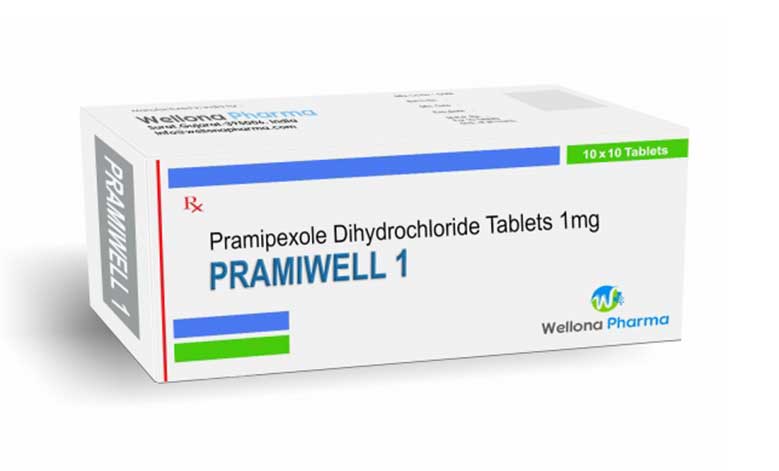Prescription drug abuse occurs when you use a drug in a manner not prescribed so you can feel happy and relaxed, or “high.” For example, some people try to get high using a prescription drug called pramipexole.
Here’s what you should know about this drug and whether it can actually get you high.
What Is Pramipexole?
Pramipexole dihydrochloride is a prescription drug used to treat symptoms of Parkinson’s disease (PD), including stiffness, slowed movements, and uncontrollable shaking of parts of the body.
It can also treat restless legs syndrome (RLS), a neurologic movement disorder that causes an intense urge to move the legs, especially when resting in bed.
Pramipexole is classified as a non-ergot dopamine receptor agonist. It works by attaching to dopamine receptors (specifically D2 and D3 receptors) in two areas of the brain: the striatum and the substantia nigra.
The United States Food and Drug Administration (FDA) has approved two formulations of pramipexole: a standard formulation sold under the brand name Mirapex, and an extended-release formulation sold under the brand name Mirapex ER.
Both types are sometimes prescribed alongside other medications for Parkinson’s disease and RLS, such as levodopa.
Can You Get High On Pramipexole?
In general, pramipexole will not make you feel high the way other drugs can. However, some people experience mild euphoria (happiness) when they abuse pramipexole.
Abusing pramipexole means using it in a manner not recommended by your prescribing physician. For example, you might use it more often than prescribed, use higher doses than prescribed, or use it without a prescription.
Like other types of drug abuse, pramipexole abuse poses serious risks.
Risks Of Pramipexole Abuse
People who abuse pramipexole risk the following adverse events:
Increased Side Effects
Like other prescription drugs, pramipexole can have side effects. To reduce these effects, most clinicians will start you on a low dose of pramipexole and gradually increase it. This is called titration.
When you abuse pramipexole, however, you face a much higher risk of side effects. The most common side effects of pramipexole include:
- sleepiness
- dizziness
- loss of balance
- weakness
- nausea
- constipation
- diarrhea
- dry mouth
- trouble falling or staying asleep
- abnormal dreams
- memory impairment
Rarer, more serious side effects include:
- vision changes
- weak, stiff, or aching muscles
- red, dark, or cola-colored urine
- irritability
- aggression
- confusion
- hallucinations (seeing, hearing, or feeling things that aren’t really there)
- erectile dysfunction
- significant orthostatic hypotension (a sharp drop in blood pressure that causes dizziness when you stand up)
- damage to your posture
- augmentation (worsening) of RLS symptoms
- dyskinesias (uncontrollable muscle movements)
- rhabdomyolysis (severe muscle damage)
If you experience these more serious side effects, contact your doctor right away.
Compulsive Behaviors
You should also contact your doctor if you suddenly develop compulsive behaviors such as gambling, overeating, hypersexuality, or compulsive shopping.
According to case reports and clinical trials concerning the efficacy of pramipexole, some people develop compulsive behaviors when using the drug.
However, researchers have not determined whether these behaviors are actually caused by pramipexole.
Some studies suggest that Parkinson’s disease patients are more likely to display compulsive behaviors (even if they don’t take pramipexole) because of how the disease affects the body’s dopaminergic (dopamine) system.
Adverse Drug Interactions
Pramipexole may have adverse effects when mixed with certain substances. For example, alcohol can increase the sedative effects of pramipexole, leading to extreme drowsiness and dizziness.
Other substances that may interact negatively with pramipexole include:
- antidepressants, including selective serotonin reuptake inhibitors (SSRIs), monoamine oxidase inhibitors (MAOIs), and tricyclic antidepressants
- benzodiazepines, such as alprazolam (Xanax), clonazepam (Klonopin), and lorazepam (Ativan)
- other dopamine agonists, such as bromocriptine, cabergoline, and ropinirole
- dopamine antagonists, including antipsychotics such as phenothiazine and atypical antipsychotics such as ziprasidone
To avoid negative drug interactions, tell your doctor about every medication and supplement you use before you start using pramipexole.
Worsened Medical Conditions
Pramipexole may worsen the symptoms of certain medical conditions, including:
- low blood pressure
- renal failure (kidney failure)
- sleep disorders (besides RLS)
If you have one of these conditions, your doctor will likely recommend that you discontinue pramipexole and switch to another medication.
Pregnancy & Breastfeeding Problems
Although more research is needed, using pramipexole while pregnant or breastfeeding could cause side effects in your baby.
Overdose
If you take more pramipexole than prescribed, you may overdose. Common symptoms of pramipexole overdose include:
- fast heart rate
- irritability
- confusion
- hallucinations
If you think you or someone you know is overdosing on pramipexole, call the poison control helpline (1-800-222-1222). If the person who overdosed experiences seizures, trouble breathing, or loss of consciousness, call 911.
Pramipexole Abuse Treatment Options
The only way to avoid the above risks is to stop abusing pramipexole. If you feel unable to do so, seek help at a substance abuse treatment program. These programs provide therapy, psychiatry, support groups, and other services to help you control your use of pramipexole.
To learn more about substance abuse treatment options, please reach out to Northeast Addictions Treatment Center. Our board-certified healthcare providers offer personalized, evidence-based care to keep you or your loved one healthy.
Sources
Food and Drug Administration — Mirapex
Journal of Medical Toxicology — Pramipexole Overdose Associated with Visual Hallucinations, Agitation and Myoclonus
National Library of Medicine: MedlinePlus — Pramipexole





